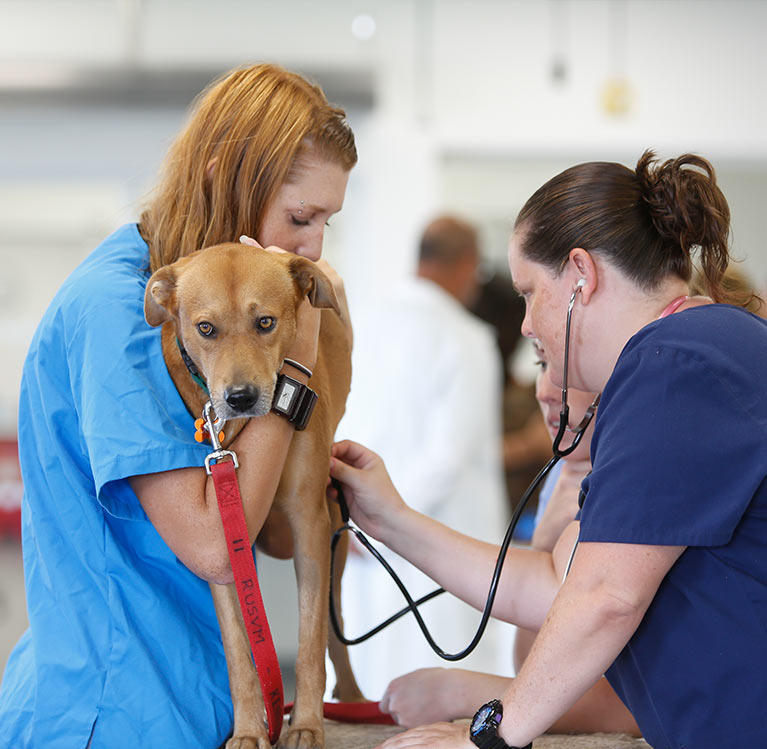Inoculation Guidelines From Your Trusted Vet
Inoculation guidelines supplied by your trusted vet play a crucial function in safeguarding your pet's health and wellness and health. In addition, resolving typical misunderstandings bordering vaccines can even more improve family pet proprietors' confidence in these preventative measures.

Value of Vaccinations
Vaccinations play an essential function in securing animals against a variety of avoidable illness. By promoting the body immune system to recognize and combat specific virus, injections considerably lower the incidence of infectious diseases that can impact a pet's health and longevity. Not only do inoculations secure private animals, however they also contribute to herd resistance, consequently lowering the total occurrence of diseases in the pet populace.
Prompt vaccinations help to minimize the spread of conditions such as rabies, parvovirus, and distemper, which can have extreme repercussions for both animals and humans. In addition, inoculations are typically a requirement for boarding facilities, brushing services, and dog parks, making them crucial for those that wish to mingle their pets.

Core Vaccinations for Family Pets
While the particular vaccination demands of family pets can vary based upon private factors, core vaccines are globally suggested to safeguard versus one of the most significant and typical illness (Emergency Vet). Core vaccines are those regarded important for all pets, despite their way of living or geographic area, as they protect versus possibly fatal and very contagious ailments
For pet dogs, the core vaccines consist of those for canine distemper, parvovirus, adenovirus (hepatitis), and rabies. Canine distemper is a viral condition that affects the respiratory system, stomach, and nervous systems. Parvovirus is understood for creating severe gastrointestinal ailment, particularly in young puppies. Adenovirus can cause liver illness, while rabies is a zoonotic disease that positions a threat to both animals and human beings.
In felines, core vaccines include feline panleukopenia, feline calicivirus, feline herpesvirus (rhinotracheitis), and rabies. Feline panleukopenia is an extremely transmittable viral illness that affects the immune system and intestines. Calicivirus and herpesvirus are major factors to top respiratory infections in felines, while rabies stays an essential worry for public health and wellness.
Seek advice from your veterinarian to ensure your pets obtain their core inoculations on time.
Non-Core Vaccines Explained
Non-core injections are tailored to deal with details threats related to an animal's exposure, setting, and way of living to specific illness. Unlike core vaccines, which are widely recommended for all pets, non-core vaccinations are considered based on individual situations. These vaccinations are especially essential for family pets that may experience special microorganisms because of their geographical area, travel behaviors, or tasks.
Examples of non-core vaccines include those for Bordetella bronchiseptica, which is linked to kennel coughing, and Lyme condition, triggered by ticks. Animals that often engage with various other animals, such as those in boarding centers, pet dog parks, or brushing atmospheres, might benefit from Bordetella vaccination. If you live in a location where Lyme illness is prevalent, immunizing against this disease can be a sensible selection for outdoor-loving pet dogs.
Other non-core injections may consist of those for leptospirosis, canine flu, and feline leukemia, depending upon the details risk variables existing. It is important to have a comprehensive conversation with your vet regarding your pet dog's lifestyle and the potential need for these vaccines, ensuring a tailored vaccination method that best secures your furry good friend.
Vaccination Set Up Introduction

As family pets grow, it is necessary to comply with the suggested booster inoculations. Emergency Vet. For grown-up pets, core injections are normally given each reference to three years, depending upon the certain vaccination and neighborhood laws. Non-core injections may be advised based upon lifestyle aspects and regional illness frequency, necessitating a tailored method
Regular veterinary check-ups are important for updating vaccination schedules. Your veterinarian can offer assistance on one of the most appropriate immunizations for your pet dog, factoring in age, wellness standing, and ecological dangers. By staying proactive and educated, pet owners can ensure their hairy companions get prompt and reliable vaccinations, thereby protecting their health and wellness throughout their lives.
Typical Myths Concerning Injections
Mistaken beliefs concerning family pet inoculations can result in complication and unwillingness among pet dog owners pertaining to the booster shot procedure. One common misconception is that vaccines are unnecessary for indoor animals. While it holds true that interior pet dogs encounter reduced dangers, they are not completely immune to diseases, as microorganisms can be introduced through various methods, including human clothes and other family pets.
An additional false impression is that vaccines can create the diseases they aim to stop. In fact, a lot of vaccines contain inactivated or attenuated microorganisms, which can not create disease in healthy and balanced animals. Some animal proprietors also believe that their pet dogs must not be vaccinated if they are already healthy; nevertheless, inoculations are a proactive procedure that aids stop the onset of disease.
Furthermore, numerous family pet owners are afraid that injections will lead to lasting health complications. The advantages of vaccination-- securing pets from possibly Pet Vaccinations lethal conditions-- much surpass the risks.
Final Thought
In summary, adherence to vaccination guidelines is essential for making sure the health and wellness and longevity of family pets. Core injections supply crucial defense versus significant diseases, while non-core injections resolve particular risks based upon individual way of lives. Developing a thorough inoculation timetable, along with regular veterinary check-ups, promotes optimum health and wellness monitoring. Resolving typical myths surrounding inoculations additionally enhances the value of educated decision-making in pet dog care. Ultimately, a positive approach Look At This to vaccinations is crucial for maintaining pet wellness.
Not only do inoculations protect private animals, yet they also add to herd resistance, therefore lowering the overall prevalence of illness in the animal populace.
Misconceptions regarding animal inoculations can lead to complication and hesitation amongst animal owners regarding the booster shot process. While it's true that indoor animals deal with reduced risks, they are not completely immune to illness, as pathogens can be presented through various ways, consisting of human clothing and other pet dogs.
Some pet dog owners additionally think that their animals ought to not be vaccinated if they are already healthy; nevertheless, vaccinations are a proactive action that helps stop the beginning of disease.
The advantages of inoculation-- shielding pet dogs from potentially dangerous illness-- far outweigh the risks.